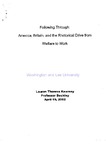Following Through: America, Britain, and the Rhetorical Drive from Welfare to Work

View/
Author
Kearney, Lauren T.
Subject
Washington and Lee University, Shepherd Poverty Program
Public welfare
Poverty -- Government policy -- Evaluation
Personal Responsibility and Work Opportunity Reconciliation Act of 1996 (United States)
Earned income tax credit
Medical policy
Metadata
Show full item recordDescription
Lauren T. Kearney is a member of the Class of 2002 of Washington and Lee University. Capstone; [FULL-TEXT FREELY AVAILABLE ONLINE] Sharing a similar cultural, sociological, and legal background, the United States and the United Kingdom provide one another with an opportunity for comparison and reflection. In the specific arena of public assistance, it is difficult not to note the striking similarities between programs in the two nations, as well as the important differences and outcomes that also can be found. Undoubtedly, some programs will be extremely fundamentally different from one another, as is the case in health care provision, while others will merely vary in the details, as we find in tax credits for the poor. Regardless of the degree to which they differ, the implementation, philosophy, and outcomes of each program in the US and the UK will provide us with a thought-provoking lesson in public assistance policy. It is in this function that the similarities between the two nations are most important, for it allows us to conjecture with more certainty whether or not a successful program in one nation can be modified and adopted to work in another. [From Introduction] Lauren Theresa Kearney